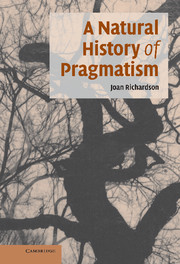Book contents
- Frontmatter
- Contents
- Preface
- List of abbreviations
- 1 Introduction: frontier instances
- 2 In Jonathan Edwards's room of the idea
- 3 Emerson's moving pictures
- 4 William James's feeling of if
- 5 Henry James's more than rational distortion
- 6 Wallace Stevens's radiant and productive atmosphere
- 7 Gertrude Stein, James's Melancthon/a
- Notes
- Bibliography
- Index
3 - Emerson's moving pictures
Published online by Cambridge University Press: 22 September 2009
- Frontmatter
- Contents
- Preface
- List of abbreviations
- 1 Introduction: frontier instances
- 2 In Jonathan Edwards's room of the idea
- 3 Emerson's moving pictures
- 4 William James's feeling of if
- 5 Henry James's more than rational distortion
- 6 Wallace Stevens's radiant and productive atmosphere
- 7 Gertrude Stein, James's Melancthon/a
- Notes
- Bibliography
- Index
Summary
Indeed, what reason may not go to school to the wisdom of bees, ants, and spiders?
Thomas Browne, Religio MediciIN THE BEGINNING WAS THE WORD
“We too must write Bibles, to unite again the heavens and the earthly world. The secret of genius is to suffer no fiction to exist for us; to realize all that we know; in the high refinement of modern life, in arts, in sciences, in books, in men, to exact good faith, reality, and a purpose; and first, last, midst, and without end, to honor every truth by use.” Thus, retrospectively, in 1850, having in 1845 delivered the lectures which would be collected under the title of “Representative Men,” Emerson closed “Goethe; or, The Writer.” His coda clearly restates the continuing necessity of a sacred office, a ministerial function, but now “in the high refinement of modern life,” the performance of this office is no longer to read through received testaments but to “write Bibles,” records of a new, “original relation to the universe.” The questions opening Nature (1836) are to be explicitly answered by this ongoing activity: “But when a faithful thinker, resolute to detach every object from personal relations, and see it in the light of thought, shall, at the same time, kindle science with the fire of holiest affections, then will God go forth anew into the creation. ”
- Type
- Chapter
- Information
- A Natural History of PragmatismThe Fact of Feeling from Jonathan Edwards to Gertrude Stein, pp. 62 - 97Publisher: Cambridge University PressPrint publication year: 2006

